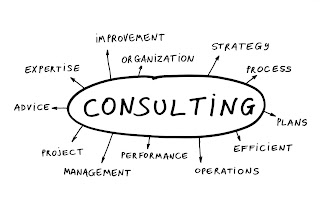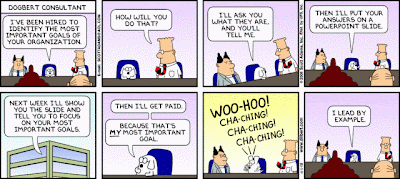Numerous issues in a nonprofit organization rise to the occasion of requiring paid
outside assistance. These involve acknowledging you’re facing something larger
than your in-house skill set can handle alone. Accepting that help is needed
is the first step in any weakness or dysfunctional behavior – whether of a
person or an organization.
Sometimes a struggling organization just needs help transitioning to its next stage of growth. Perhaps a well established organization needs help re-inventing itself. Facing reality is the most difficult when leaders and staff are deeply ingrained in the present organizational culture. It becomes even harder if the leader is a founder or long-term CEO, where he or she may be sensing a loss of control or that recent changes are becoming overwhelming. A lack of positive organizational dynamics keeps many dysfunctions hidden, and people are unwilling to be the one vulnerable enough to upset the apple cart.
Consulting with outside professionals isn’t limited to the need of
addressing serious issues . . . most leaders could use regular coaching with
peers and/or professional consultants. But some circumstances call for more serious
consideration for outside help:
Strategic Planning. This process can require an anonymity that an independent
consultant allows. Often I’ve found a key staff or board member who admits to
not being sure of the direction or even of the organization’s mission and
vision. In one case it was found that a
new board member wasn’t aware of the organization’s religious core principles
of faith. Appropriately laying the foundation before discussing strategy is critical to success.
Analyzing fundraising effectiveness. In such a volatile economic
landscape, it can become comfortable for an organization to stay the course with tired or
limited funding appeals and stale communications. Organizations tend to stay
with old metrics and “shot-gunning” rather than using new tools to target a segment of their donor
base who are more likely to respond to different types of communications. E-commerce
is still only effective in a small portion of demographics, and it is key to
understand when and how to phase that in.
Closely aligned with fundraising is an understanding of an organization’s
publics – those who can control or limit an organization’s ability to
flourish. Many times an organization has “blinders” and they are not aware
that they’ve grown myopic in their programs and vision. I’ve seen organizations
atrophy due to ignoring the reality of their external context and
relationships. This is where familiarity
breeds contempt; stakeholders who once supported and helped form the
organization can, if ignored or taken for granted, become the worse critics.
A most serious issue that desperately demands immediate assistance is internal
organizational conflict due to a lack of unity in mission and vision. It's
critical to quickly re-establish clarity of mission and unity between the leaders and
the staff or board. This requires outside intervention. But choose the
consultant carefully, as this requires a professional who is able to decipher
the organization’s deeper cultural and personal issues – not merely personnel or HR issues that are on the surface. The former is ripe with personality clashes and broken trust, while
the latter involves organization policy and procedure – which may need
addressing, but is not the root cause.
I will mention briefly the need for a consultant and/or interim management through a period of crisis leadership change. Addressing this will require a separate blog, but it's most critical to contract with outside assistance rather than use internal staff in such a case.
These are just a few areas of concern where an independent third party will be able to increase awareness, broker unity, and ensure the stability and sustaining of the organization’s mission. Don’t wait until you realize the need – develop relationships with those you trust and who will be ready and willing to intercede within your organization when needed. While these resources may be costly, you will save time and money with the judicious use of consultants. They will be worth it to the organization, as you will gain much more than you spend. They may be reported as an expense, but they are an asset to any organization.
I will mention briefly the need for a consultant and/or interim management through a period of crisis leadership change. Addressing this will require a separate blog, but it's most critical to contract with outside assistance rather than use internal staff in such a case.
These are just a few areas of concern where an independent third party will be able to increase awareness, broker unity, and ensure the stability and sustaining of the organization’s mission. Don’t wait until you realize the need – develop relationships with those you trust and who will be ready and willing to intercede within your organization when needed. While these resources may be costly, you will save time and money with the judicious use of consultants. They will be worth it to the organization, as you will gain much more than you spend. They may be reported as an expense, but they are an asset to any organization.
For more information on choosing Consultants:




No comments:
Post a Comment